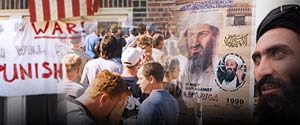The Rediff Special/ Anil Athale


Part I: World War III?
The last major conflict of the 20th century, the Second World War, was
an ideological conflict against Nazism, Fascism and Japanese Militarism. Despite several overtures for a negotiated peace, at great cost, the Americans insisted on an 'Unconditional Surrender' as the only acceptable outcome. The first war of the 21st century is being dubbed a 'War Against Terrorism' and neither against Osama bin Laden or Afghanistan.
Destruction of the ideology of terrorism is the eventual goal. Without hedging and using platitudes, let us face it, it is a war against 'radical Islam.' With adherents in over 60 countries, the fine
distinction between radical Islam and peaceful Islam is at the best of times a difficult proposition. The danger of this turning into a clash of civilisations is very real and one false step on either side and mankind will slip into a quagmire.
Islam in general and radical Islam in particular presents a great problem in a world that is increasingly integrated. While there is indeed great similarity in the teachings of all religions, Islam is
particularly vehement about rejecting all other faiths. The division of world into Darul Hrab and Darul Haram, the constant invocation to destroy non-believers and Haj rituals like stoning Satan makes
Islam a particularly militant faith.
The use of Islam for political purposes and confining the teaching of Islam in regard to peace and brotherhood to Muslims alone has given birth to radical Islam. The Muslim ulema's attempt to obliterate pre-Islamic history has been a contributory factor. Is it any surprise that moderate Islam flourishes in those countries that have managed to retain their links with their pre-Islamic past?
This is so in the case of Egypt (pharoahs and pyramids), Iran (Darius and Zorashtra) , Indonesia (Hinduism), Iraq (Babylonian) et al. It is in this respect that Afghanistan, Pakistan, Saudi Arabia are unique. It is this syndrome that led to ethnic cleansing of Hindus from Pakistan, the destruction of Buddha at Bamiyan in Afghanistan or the ousting of Kashmiri Pandits from the Kashmir valley.
It is patently unfair to single out Islamic fanaticism. There are fanatics in all religions and while the world deals with radical Islam and its terrorist manifestation, it cannot ignore Jewish zealots,
Christian fundamentalists, Hindu fanatics or militant Buddhists. Then there are racist like Aryan Nation in the US (members of which were responsible for the Oklahoma city bombing), the National party in Britain, neo Nazis in Germany and Tamil fanatics in Sri Lanka.
There is also a danger in equating radical Islamic terrorism that has destruction of the existing world as its goal, with other forms of violence used by many aggrieved groups as a weapon to fight perceived injustice. Thus, the Palestinian resistance, the LTTE, Chechens and Kashmiri insurgents have at one time or the other used terrorist tactics. The justification for this has been State terror. But it must also be pointed out that the Vietnamese successfully fought the Americans without ever using terror tactics. Neither did the tribals in India's northeast, Nagas and Mizos, use this tool.
To successfully eradicate terrorism from the world, even as a tactic, a non-discriminatory, universal and compulsory regime to curb State terrorism would be necessary. This would mean putting restrictions on the sovereignty of nations. Is the world ready for it? As long as this does not happen, the 'radicals,' for whom terrorism is not just a means but an end, would continue to justify their actions by pointing out at the injustices being heaped on some. One way out of this would be to concentrate on the 'acts' of terror and outlaw them.
But for this to succeed, there will have to be corresponding commitment by all the states to the
principles of democracy, freedom and human rights. One of the reason for a certain ambiguity in response by countries like China is rooted in this. In short, what one is looking at is a world order in which certain values will be forced on all the states of the international community.
Logically, the fight against terrorism is a fight against fanaticism. There are socio-economic causes that promote it. These range from restrictive social practices, discrimination based on caste and creed, poverty and over population. Elimination of terrorism thus implies an end to conflict on earth, indeed a tall order.
It is obvious that the terrorists involved in the September 11 bombings abused the liberties available in a democratic and plural society like the USA. India has been facing a similar dilemma for decades. After all, the ideological trail of Osama bin Laden may well end up at the seminary in Deoband, India. There is a great danger that to curb the menace of fanaticism, plural societies may have to give up their liberties and curtail the freedom enjoyed by their citizens. That would signify a victory to the perpetrators of murder on September 11. It is indeed a Hobson's choice for the free world.
One is sure intellectuals and policy makers in the US, who have declared a crusade or jihad against terrorism ('We will not rest till the last terrorist is eliminated') , would be aware of the pitfalls of the sweeping objective of the new war. Unfortunately, history is witness to many occasions where flippant rhetoric and statements soon solidify into positions from where retreat to pragmatism becomes an impossibility. Rhetoric and commitments have their own momentum and there is a snowballing effect.
Also see:
Terrorism in America: The complete coverage
Design: Dominic Xavier
The Rediff Specials